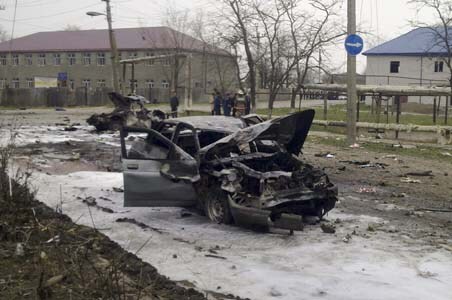
AP Image
Moscow:
The second Moscow suicide bomber may have been a 28-year-old school teacher from the southern province of Dagestan, a Russian newspaper reported on Sunday, quoting the woman's father as saying he recognised her in a photograph.
Rasul Magomedov told Novaya Gazeta that an acquaintance sent him a photograph of the subway suicide bomber that has been widely circulated on the Internet.
"My wife and I immediately recognised our daughter Maryam," the newspaper quotes him as saying. "The last time my wife saw our daughter she was wearing the same red scarf as in the photograph."
Magomedov said his daughter, Maryam Sharilova, disappeared the day before the March 29 bombings that shocked Moscow, though he has no idea how she got to the city from their home in southern Russia.
The attack by two female suicide bombers killed 40 rush-hour commuters and wounded at least 121.
One of the bombers has been identified as the 17-year-old widow of a slain Islamic militant, also from Dagestan, one of several predominantly Muslim provinces in the North Caucasus.
Investigators were still trying to identify the second bomber and track down the organizers of the attack, for which a Chechen militant leader has claimed responsibility.
No officials were available to comment on the Novaya Gazeta report late Sunday.
The newspaper Kommersant, the first to identify the teenage bomber and publish her photograph, reported Friday that the second bomber had been tentatively identified as a 20-year-old woman from Chechnya, the widow of another militant leader who had recently been killed by security forces.
Magomedov told Novaya Gazeta that security forces recently told him his daughter was the wife of an Islamic militant. But when he asked his daughter, she told him she would never marry without his consent.
His daughter was a school teacher like both of her parents in their hometown of Balakhani and lived at home, he told the newspaper.
"She was religious, but she never expressed any radical beliefs," Magomedov was quoted as saying.
The subway suicide bombings were the first such attacks in Moscow since 2004 and refocused attention on the Islamic insurgency that for years has been confined to the North Caucasus.
Dagestan was the site of two suicide bombings on Wednesday that killed 12 people, mostly police officers. Another explosion there on Thursday killed two suspected militants.
On Sunday, two powerful explosions derailed a cargo train, but no one was injured.
Dagestan has been an epicenter of the almost daily violence that continues to rock the North Caucasus following two separatist wars in neighboring Chechnya. The militants are now seeking to create an Islamic state across the region.
Prime Minister Vladimir Putin has vowed to "drag out of the sewer" the organizers of the subway bombings, and Prime Minister Dmitry Medvedev promised "crueler" measures to crack down on terrorism.
Human rights groups accuse Russian security forces and police of fueling the insurgency through extrajudicial killings, abductions and abuses in the North Caucasus.
Rasul Magomedov told Novaya Gazeta that an acquaintance sent him a photograph of the subway suicide bomber that has been widely circulated on the Internet.
"My wife and I immediately recognised our daughter Maryam," the newspaper quotes him as saying. "The last time my wife saw our daughter she was wearing the same red scarf as in the photograph."
Magomedov said his daughter, Maryam Sharilova, disappeared the day before the March 29 bombings that shocked Moscow, though he has no idea how she got to the city from their home in southern Russia.
The attack by two female suicide bombers killed 40 rush-hour commuters and wounded at least 121.
One of the bombers has been identified as the 17-year-old widow of a slain Islamic militant, also from Dagestan, one of several predominantly Muslim provinces in the North Caucasus.
Investigators were still trying to identify the second bomber and track down the organizers of the attack, for which a Chechen militant leader has claimed responsibility.
No officials were available to comment on the Novaya Gazeta report late Sunday.
The newspaper Kommersant, the first to identify the teenage bomber and publish her photograph, reported Friday that the second bomber had been tentatively identified as a 20-year-old woman from Chechnya, the widow of another militant leader who had recently been killed by security forces.
Magomedov told Novaya Gazeta that security forces recently told him his daughter was the wife of an Islamic militant. But when he asked his daughter, she told him she would never marry without his consent.
His daughter was a school teacher like both of her parents in their hometown of Balakhani and lived at home, he told the newspaper.
"She was religious, but she never expressed any radical beliefs," Magomedov was quoted as saying.
The subway suicide bombings were the first such attacks in Moscow since 2004 and refocused attention on the Islamic insurgency that for years has been confined to the North Caucasus.
Dagestan was the site of two suicide bombings on Wednesday that killed 12 people, mostly police officers. Another explosion there on Thursday killed two suspected militants.
On Sunday, two powerful explosions derailed a cargo train, but no one was injured.
Dagestan has been an epicenter of the almost daily violence that continues to rock the North Caucasus following two separatist wars in neighboring Chechnya. The militants are now seeking to create an Islamic state across the region.
Prime Minister Vladimir Putin has vowed to "drag out of the sewer" the organizers of the subway bombings, and Prime Minister Dmitry Medvedev promised "crueler" measures to crack down on terrorism.
Human rights groups accuse Russian security forces and police of fueling the insurgency through extrajudicial killings, abductions and abuses in the North Caucasus.
Track Latest News Live on NDTV.com and get news updates from India and around the world

